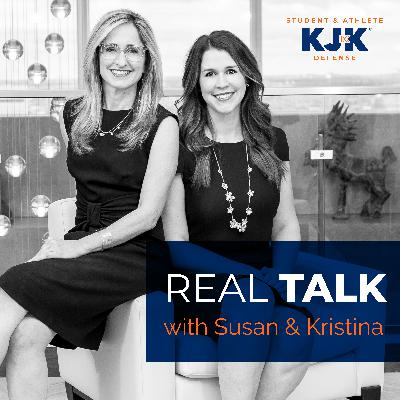Advice and Tips for Parents: Helping Kids Navigate Drugs and Alcohol on Campus
Description
In this episode of Real Talk, KJK Student Defense Attorneys Susan Stone and Kristina Supler talk about when and how parents should talk to their college bound kids about drugs and alcohol, practical advice about drugs on campus, and tips on how parents can better monitor their child’s academics while on campus.
Show Notes:
(01:15 ) When should parents talk to their kids about drugs and alcohol
(03:57 ) Tips to help parents have conversations with their kids about drugs and alcohol
(04:31 ) Borrowing another students medication and Fentanyl
(05:11 ) Dangers of mixing alcohol with medication
(07:05 ) Do you know the campus culture your student is going to be in?
(08:34 ) How to tell if your child is doing well in their classes
(09:06 ) Why parents need to get a FERPA
(10:27 ) Is your child a good fit for college? Are they ready for college?
(12:02 ) The Red Zone: Is your child at risk?
Transcript:
Susan Stone: I love having guests and actually I do too. I know I love talking to our guests. But sometimes I feel like our listeners miss out on what makes us. And that's just the two of us talking to other.
Kristina Supler: I have fun talking to you. And I think that we often,We have such different and unique life experiences and together I think we just have, interesting insights.
Susan Stone: So you ready to talk? Let's talk. Okay. What are we talking about? I wanna talk about school starting. Kids are going off to college. Let's have a real conversation. What parents should say to their students about drugs and alcohol.
Kristina Supler: Let's. I think it's a good time of year for us to have this conversation because families are busy planning for the future. And sometimes that's when you just overlook these sort of foundational building block conversations with your kids.
Susan Stone: I think the best place to start is really being honest with yourself where your student is with regard to their relationship with drugs and alcohol in high school. So for example, some kids, and I don't wanna label them, but some kids are not using drugs or drinking alcohol. They're just not.
Kristina Supler: Oh, absolutely.
I think sometimes when there's discussion about these issues, it's easy to paint with a broad brush and say all high schoolers are partying and drinking and using drugs and having sex and engaging in everything over the top. But that's not always true.
Susan Stone: That's not true. So for those students, there's gotta be one conversation about, look, you're going to college, you're obviously gonna be exposed to this.
You probably have already made choices that are good choices. Keep up the good work.
Kristina Supler: This makes me think also about being realistic. We say this a lot, but it's true. Be realistic about who your child is for better and for worse. In terms of how likely are they to succumb to peer pressure?
Are they, is your child of the personality type of like more is always better? Or do you have a child who's more reserved and maybe shy and unlikely to jump into social situations.
Susan Stone: And anybody can be in a social situation and decide to make a choice to have a drink or experiment with something. I, and again, I hate the idea of labeling students, but anybody at any time can make a choice that doesn't turn out to end well.
Kristina Supler: I'm imagining some of our listeners saying, okay ladies, sure. You are assuming that parents have accurate insight into, how their children behave socially and maybe not all parents do, right? I agree. Agree. I mean, I, I,I think it would be, it would actually be foolish for us to assume that we know everything our own kids are doing. But I think you still know fundamentally who your child is in terms of tolerance
Susan Stone: and things like that.
I agree. And I've also heard stories of students who were big partier in high school, got to college and really grew up and buckled down. So the reverse can be true. Just because you have a big partier in high school does not mean you're gonna have a partier in college. And just because you have a kid who doesn't party in high school doesn't mean that they're gonna stay that way in college.
So I think the conversations must be had. So let's just highlight some of our favorite tips for parents.
Kristina Supler: I think. first of all, when talking to your kids about drugs and alcohol in college, it's just important to have a conversation about how there's more danger out there. And not to be fatalistic about what's out there in the world.
But in this day and age, things are being recorded. The danger of drugs, it's so much more intense than it ever used to be.
Susan Stone: I'll give you an example. Fentanyl. Yeah, that was not a problem when I went to college. Did that in, was that on your campus?
Kristina Supler: No. Oh gosh, no. No.
Susan Stone: So we do know that there, every year there are students who borrow a Friend's a. A D H D medicine, for example, and the Adderall. The Adderall. And it's laced with fentanyl. It's really important to talk to your students that you are never, ever to use anybody's prescription drugs. If they need a prescription drug, they have to see a doctor and get their own prescription drug. That to me, is a rule that you just have to pound in your student's head.
Please don't ever borrow anybody's drugs.
Kristina Supler: I'm also thinking about, we've had so many cases where, the students involved were experiencing some form of depression or anxiety and just navigating mental health issues. And in this day and age, it's fairly well known, but you can't assume everyone knows, mixing those prescription medications with alcohol can have really dangerous consequences.
Susan Stone: including feeling more depressed.
Because alcohol is a depressant. So I think it's very important if you know your student is on various medications, to maybe even have a conversation with your student's doctor and get the facts straight. What will happen? Does it reduce the effectiveness of the medication? Does it increase depression?
Education is the key there and a conversation about it is the key. Can we just talk about binge drinking now? That was around when I went to college.
Kristina Supler: Yes, indeed. Changed there and it sure is still here to stay, unfortunately. But I think that,with binge drinking, again, this idea of the hookup and everything that happens when students quote unquote party.
We're just in a different day and age now. And some of that, I think there's many students out there who recognize that, but there's also many who don't.
Susan Stone: I'll tell you the difference that is new. I don't remember people planning on drinking so much that they became blackout or brownout drunk. That language of being blackout, brownout, gray out, that was not part of my college language.
Kristina Supler: When I was in school. I mean, I definitely had friends who talked about oh, I was so blacked out last night. But I don't remember anyone. going out with the goal of becoming blacked out. I, that's definitel







